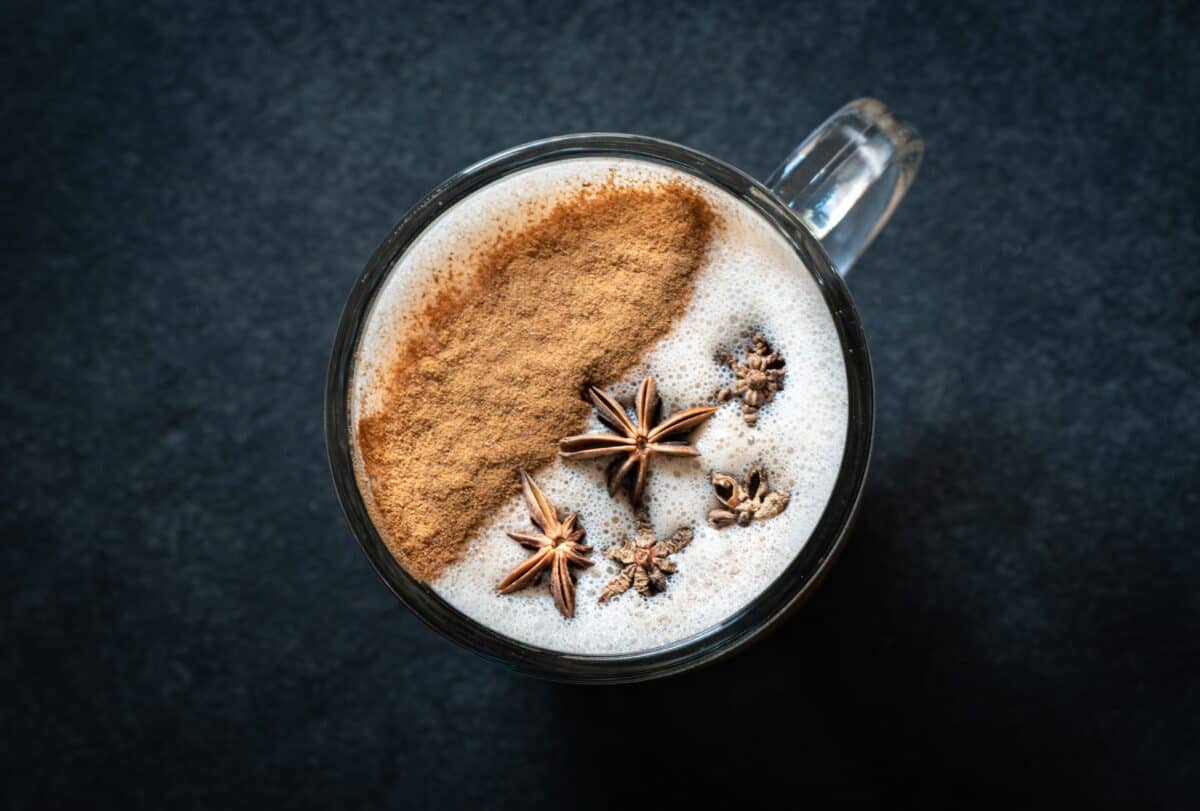From online conversations to tea time with friends, I’ve come across various opinions on whether chai lattes are good or bad for you. I will explain if a chai latte is bad for you and how you can make it a healthy drink.
Is Chai Latte Bad for You?
While a chai latte isn’t inherently wrong, the trouble lies in the added milk and sugar in most lattes, which can lead to issues like acne or sugar spikes for some people. In my experience, I’ve learned that this latte, like any beverage, can have both positives and negatives.
Enjoying the latte version should not adversely affect your health without considering its components and preparation. So, feel free to savor the rich and comforting flavors while remembering that moderation and mindful ingredient choices will help you enjoy your latte without guilt.

Chai Latte Ingredients and Their Effects
Chai, a traditional Indian beverage, is known for its blend of spices and herbs, full of anti-inflammatory properties, antioxidants, and digestive benefits. However, when it comes to chai latte, adding milk and sweeteners can make a difference in its health effects.
For this reason, it’s crucial to understand your body’s reaction to these ingredients and find a balance that works for you.
Ingredients That Influence the Health Effects of Chai Lattes
While this type of latte is generally healthy, there are still some potential drawbacks, depending on how you prepare it.
| Ingredient | Benefits | Potential Disadvantages |
| Tea | Anti-inflammatory properties and digestive benefits | Excessive caffeine intake |
| Milk | Protein and calcium intake | May increase caloric intake, lactose intolerance |
| Spices | Anti-inflammatory properties | It may upset the stomach of some people |
| Sweetener | Add flavor | Increase calorie intake |
Tea and Its Health Benefits
I appreciate the unique combination of ingredients found in chai lattes, starting with tea as the base. I often use black tea because of its benefits, such as blood sugar regulation and improved blood pressure.
The presence of antioxidants in black tea also contributes to the overall health benefits of this delightful beverage.
Spices and Their Impact
One of my favorite aspects of chai lattes is the mix of spices. The blend usually includes cinnamon, ginger, cardamom, and cloves, known for their anti-inflammatory properties and antioxidants.
I like drinking this latte version because the spices aid in my digestion. The spices make the latte a tasty yet healthy drink.
Milk and Its Effect
While traditional chai tea is brewed with water, chai lattes add milk to create a creamy, rich texture.
The milk not only provides a smooth mouthfeel. It also contributes essential nutrients such as protein, calcium, and vitamins. However, it does increase the caloric content, with an eight-ounce chai latte containing between 120 and 200 calories.

Sugar: An Unwelcome Additive
The one potential downside of chai lattes, particularly those found at coffee shops, is the addition of sugar or sweeteners. This can significantly increase the overall calories and negate some health benefits of tea and spices.
Hence, it’s vital to be mindful of sugar content when ordering or making this kind of latte at home. Being a coffee expert also means knowing when and how to indulge more healthily.
Calories and Nutrient Content in Chai Lattes
Regarding nutritional content, a typical small chai made with skim milk can have around 113 calories. This may increase if you opt for whole milk or larger sizes. Consider these numbers if you’re watching your calorie intake.
Compared to Other Beverages
As someone who continuously tries various drinks, I also compare the calorie count in a chai latte to other popular beverages. For example, a four-ounce cup of this latte can have 200 calories. On the other hand, an average cup of black coffee contains only two calories.
If you add milk and sugar to your coffee, the calories will rise to about 30. In comparison, a Starbucks Venti Chai Latte has 240 calories, with 50 of them coming from fat.
Factors Affecting Calories and Nutrients
Regarding chai lattes, the ingredients used can significantly impact the nutritional content and calorie count.
For instance, I noticed increased calorie intake when I used whole milk to prepare this latte. This encouraged me to switch to an alternative like almond milk, which generally resulted in fewer calories and less fat.
Moreover, the type of sweetener used, be it white sugar, brown sugar, or honey, also affects the calorie count and nutritional profile. With that said, be mindful of the ingredients in your chai to make informed choices about its nutritional content and how it fits into your overall dietary goals.

Potential Drawbacks and Concerns
I have discovered that the key to maintaining the health benefits of this kind of latte is making mindful choices regarding the ingredients. However, some ingredients may still have disadvantages for some people.
- Caffeine content: While the latte version typically contains less caffeine than a regular cup of coffee, caffeine can still negatively affect some individuals. Too much caffeine can lead to insomnia, anxiety, and even kidney failure in extreme cases. If you’re sensitive to caffeine, you must monitor your latte intake carefully.
- Sugar and sweeteners: Many chai lattes available at cafes and restaurants come loaded with added sugars and sweeteners. This can lead to unhealthy amounts of sugar consumption and unwanted calories. If you’re watching your sugar intake, choose unsweetened chai lattes or prepare them at home using natural sweeteners like honey or Stevia.
- Allergies and intolerances: Some chai ingredients, such as dairy and tree nuts, can cause allergic reactions or gastrointestinal distress for specific individuals. If you have a known allergy or intolerance, be cautious when ordering and consider looking for dairy or nut alternatives.
Making Healthier Chai Lattes at Home
To make healthier chai lattes, the key is to balance the chai’s robust flavors with the milk’s creaminess and the desired sweetness. However, you can still enjoy a homemade version with these tips.
- Choose better ingredients: I use high-quality chai tea bags and unsweetened plant-based milk like almond or cashew milk. These kinds of milk are lower in calories yet can provide a creamy texture. If you are lactose intolerant, you can opt for dairy-free alternatives like almond or soy milk to avoid gastrointestinal issues.
- Use fresh spices: Prepare spices like cinnamon, cardamom, and ginger to enhance the flavor without adding extra calories.
- Reduce sugar and calories: I prefer low-calorie natural alternatives such as Stevia or xylitol instead of traditional sweeteners like sugar or honey. This way, I can still enjoy the sweetness I crave without the extra calories.
Additionally, limiting the portion size and using water to dilute the latte can reduce the overall calories without compromising taste.
Related Questions
Is a Chai Latte Better for You Than Coffee?
A chai latte can be better than coffee if you keep it low in sugar and milk. It also contains less caffeine than coffee.
Can I Drink Chai Lattes Every Day?
Technically, you can drink a chai latte every day. However, excessive consumption can lead to higher calorie and sugar intake. Consider alternating days or simply enjoying your chai as an occasional treat.
How to Make the Perfect Chai Latte?
Making the perfect chai latte starts with a strong brew of quality chai tea. After steeping the tea, I like to mix it with the steamed milk of my choice and sweeten it lightly with honey or agave syrup. Then, for an extra touch, I add a sprinkle of cinnamon or a dusting of nutmeg.
Conclusion
Whether a chai latte is bad for you depends on the ingredients and serving size. Chai contains antioxidants, which can benefit your health. However, chai lattes can also be high in calories, sugar, and potentially caffeine, depending on how you prepare them.



